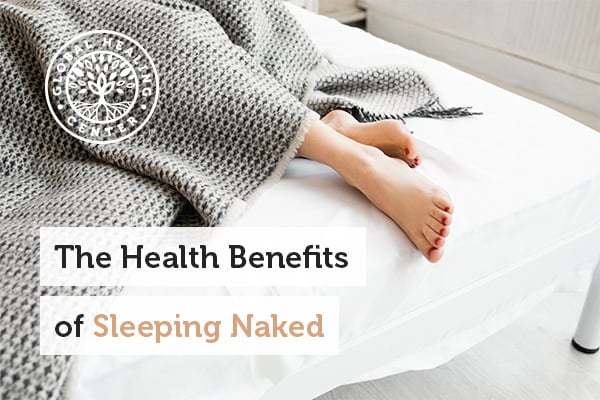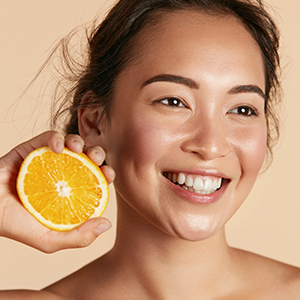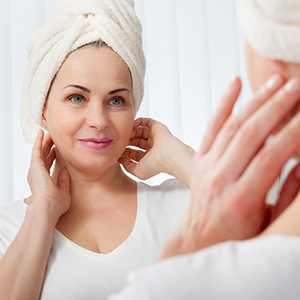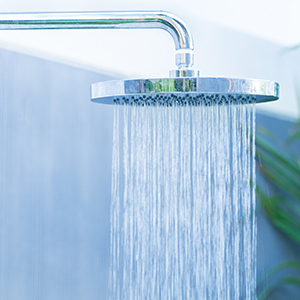
Insomnia is a bigger issue in the United States than most people think. More than a third of all American adults aren’t getting enough sleep. That’s enough to be considered an epidemic. Sleeplessness doesn’t just make you yawn; it has a significant effect on obesity, diabetes, blood circulation, muscle health, heart health, the immune system, and cognitive behavior.[1]
Because of our sleep crisis, more people than ever before have resorted to sleeping pills. In 2015, Americans spent an estimated $41 billion on sleep aids. Nearly nine million Americans use sleeping pills, and that figure continues to rise.[2] This is cause for concern as sleep aids can have severe health consequences. They may lead to dependence, addiction, and a number of negative side effects.[3, 4] Fortunately, if you can't sleep or just need a better night's rest, there’s an all-natural trick you can try.
7 Reasons to Sleep Naked
Simply sleeping naked has a host of health benefits including better sleep, balanced mood, better sex life, weight loss, and sexual health for both men and women.
1. Sleeping Naked Gives You Better Quality Sleep
Temperature has a tremendous effect on your sleep patterns and quality. While your body temperature is usually somewhere around 98.6 degrees Fahrenheit, cooler ambient temperatures support better sleep. A slight drop in room temperature signals your body that it’s bedtime, causing your brain to release a sleep hormone called melatonin. An ideal room temperature for sleeping is around 65° F.[5, 6]
Ambient temperature, pajamas, sheets, blankets, down comforters, the body heat of a sleeping partner, and the family cat dozing on your feet can all add up to make things uncomfortably warm, causing you to wake up. Shedding your pajamas and sleeping in the buff is a fantastic way to cool yourself down and enjoy your rest. Since nudity is free, it’s also significantly cheaper than cranking up the AC.
2. Napping Nude Supports Your Mood
Chronic insomnia drastically increases the risk of anxiety and depression.[7] Even partial sleeplessness can put you in a cranky mood. Fortunately, a good night’s sleep can quite literally clear your mind. We’ve always known that sleep helps support brain health, but only recently have we begun to understand why.
During your waking hours, your brain tissue gradually accumulates beta-amyloid, a protein that is toxic to nerve cells. When you sleep, your body signals the glial cells in your brain to open up and flush away these toxic proteins. With the better sleep you’ll get from going au naturale, you should be able to drain your brain and feel refreshed the next morning.[8, 9]
3. Sleeping Stark Naked Sparks Your Sex Life
Frequent nudity leading to more frequent sex may seem like a no-brainer. However, there’s a little more to it than just easier access. Skin to skin contact triggers your pituitary gland to release oxytocin. Often called “the love hormone," oxytocin promotes feelings of attachment and emotional closeness. In other words, sleeping naked will put you in the mood for love more often.[10]
4. Going Commando Promotes Sperm Count
Not only does sleeping nude help with the aforementioned increase in sex, it can help improve sperm count as well. The ideal temperature for sperm production is just a few degrees cooler than body temperature. Tight undergarments leave the testes too hot. Men who sleep sans undies tend to have a higher sperm count and better sperm quality than those who wear boxers or briefs.[11]
5. Nudity Supports Vaginal Health
Sleeping naked isn’t only important to men’s health; women can get the benefits of sleeping in the buff as well. The vagina is a resilient, self-cleaning organ, and sleeping nude helps it maintain balance and regulate pH levels. Constricting clothing traps heat and moisture. Warm, moist conditions encourage the growth of yeast and bacteria, possibly leading to vaginitis. Fresh air is the enemy of infection. Letting things air out by leaving your body uncovered at night can help prevent yeast infections and leave you feeling fresh.[12, 13]
6. Lose Weight by Losing Your Pajamas
No, you probably won't be able to just sleep yourself slim, but when combined with a healthy diet and regular exercise, proper sleep can help support metabolism and encourage weight loss.[14]
Sleep deprivation can wreak havoc on your hunger hormones, leading to weight gain and obesity. Your hunger hormones are leptin and ghrelin. Leptin decreases your appetite, while ghrelin increases it. Your body produces leptin naturally while in the stages of deep sleep. Fitful sleep prevents your body from producing an adequate supply of leptin, while overproducing ghrelin.
This imbalance in your hormone levels leads to an abnormally elevated feeling of hunger, causing you to eat more than you should. Poor sleep patterns are closely associated with high Body Mass Index (BMI) and obesity across all ages. Stripping before bed allows you to get better sleep and normalize your hunger hormone levels.
7. Sleeping Bare Helps Skin and Hair
Beauty rest is absolutely a real thing. Cortisol is a steroid hormone that your body produces in response to stress and low blood sugar. Missing sleep can also cause a surge in cortisol levels. Unfortunately, elevated cortisol levels suppress growth hormone and disrupt your system, damaging hair growth and degrading skin. Keeping your cortisol levels low with the right sleep schedule will help keep your hair strong and your skin beautiful.[15, 16, 17]
Points to Remember
Proper sleep is critical to your overall health. Sleeping nude won’t cure all sleep disorders, but it could help you rest a little better. It’s fun and free in more ways than one. Give it a try tonight and see if you feel the difference.
There are many other ways to naturally improve your sleep habits. Keep your bedroom dark, turn off electronics a couple of hours before bedtime and do not bring them into where you sleep. If natural habits are not helping, the time-trusted natural herbal remedy, valerian, may help.
What helps you sleep? Comment below!
References (18)
- "1 In 3 Adults Don’t Get Enough Sleep." Centers for Disease Control and Prevention. US Department of Health and Human Services, n.d. Web. 10 Aug. 2017.
- Chong Y, Fryar CD, Gu Q. "Prescription sleep aid use among adults: United States, 2005–2010." NCHS data brief, no 127. Hyattsville, MD: National Center for Health Statistics. 2013.
- Kripke, Daniel F, Robert D Langer, and Lawrence E Kline. "Hypnotics’ Association with Mortality or Cancer: A Matched Cohort Study." BMJ Open 2.1 (2012): e000850. PMC. Web. 10 Aug. 2017.
- "Using Medication: What Can Help When Trying to Stop Taking Sleeping Pills and Sedatives?" National Center for Biotechnology Information. U.S. National Library of Medicine, 06 Nov. 2013. Web. 10 Aug. 2017.
- Okamoto-Mizuno, Kazue, and Koh Mizuno. "Effects of Thermal Environment on Sleep and Circadian Rhythm." Journal of Physiological Anthropology 31.1 (2012): 14. PMC. Web. 10 Aug. 2017.
- Metz, Ryan. "SiOWfa15: Science in Our World: Certainty and Controversy." SiOWfa15 Science in Our World Certainty and Controversy. The Pennsylvania State University, 7 Sept. 2015. Web. 10 Aug. 2017.
- "Sleep and Mood." Get Sleep. Division of Sleep Medicine at Harvard Medical School, 15 Dec. 2008. Web. 10 Aug. 2017.
- "Brain May Flush out Toxins during Sleep." National Institutes of Health. U.S. Department of Health and Human Services, 17 Oct. 2015. Web. 10 Aug. 2017.
- "How Sleep Clears the Brain." National Institutes of Health. U.S. Department of Health and Human Services, 28 Oct. 2013. Web. 10 Aug. 2017.
- Uvnäs-Moberg, Kerstin, Linda Handlin, and Maria Petersson. "Self-Soothing Behaviors with Particular Reference to Oxytocin Release Induced by Non-Noxious Sensory Stimulation." Frontiers in Psychology 5 (2014): 1529. PMC. Web. 10 Aug. 2017.
- Sapra, K. J., Eisenberg, M. L., Kim, S., Chen, Z. and Buck Louis, G. M. "Choice of underwear and male fecundity in a preconception cohort of couples." Andrology, 4 (2016): 500–508. Web. 10 Aug. 2017.
- "Letting My Vagina Breathe at Night." Go Ask Alice! The Trustees of Columbia University in the City of New York, n.d. Web. 10 Aug. 2017.
- "Maintaining Vaginal Health." Cornell Health. Cornell University, 13 Mar. 2017. Web. 10 Aug. 2017.
- Taheri, Shahrad,. et al. "Short Sleep Duration Is Associated with Reduced Leptin, Elevated Ghrelin, and Increased Body Mass Index." Ed. Philippe Froguel. PLoS Medicine 1.3 (2004): e62. PMC. Web. 10 Aug. 2017.
- Thom, E. "Stress and the Hair Growth Cycle: Cortisol-Induced Hair Growth Disruption." J Drugs Dermatol 8th ser. 1.15 (2016): 1001-004. Web. 10 Aug. 2017.
- Leproult, R., et al. "Sleep Loss Results in an Elevation of Cortisol Levels the Next Evening." Sleep 20.10 (1997): 865-70. Web. 10 Aug. 2017.
- Rudman, Daniel, Axel G. Feller, Hoskote S. Nagraj, Gregory A. Gergans, Pardee Y. Lalitha, Allen F. Goldberg, Robert A. Schlenker, Lester Cohn, Inge W. Rudman, and Dale E. Mattson. "Effects of Human Growth Hormone in Men over 60 Years Old." New England Journal of Medicine 323.1 (1990): 1-6. Web. 10 Aug. 2017.
- Okawa, M., K. Mishima, T. Nanami, T. Shimizu, S. Iijima, Y. Hishikawa, and K. Takahashi. "Vitamin Bl2 Treatment for Sleep-Wake Rhythm Disorders." Sleep 13.1 (1990): 15-23. Web. 10 Aug. 2017.
†Results may vary. Information and statements made are for education purposes and are not intended to replace the advice of your doctor. If you have a severe medical condition or health concern, see your physician.







